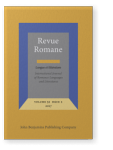Vol. 52:2 (2017) ► pp.229–259
Le impronte del traduttore
Un’analisi della traduzione svedese de I Malavoglia di Giovanni Verga
Drawing on Antoine Berman’s theory of translation as a critical act, this article analyzes the Swedish translation of Giovanni Verga's masterpiece I Malavoglia. The actual translation analysis therefore takes as its starting point a pre-analysis that highlights the translator’s individual motives to deviate from the source text. The results show that the Swedish translator has done extensive changes to Verga’s polyphonic novel, giving it a more homogeneous form. Drawing on theoretical ideas on the translator’s unconscious and habitus, the article shows that the translator has downplayed the novel’s expressive and vernacular traits as well as the patriarchal perspectives, emphasizing instead the novel’s religious paths.
Article outline
- 1.Introduzione
- 2.Pre-analisi
- 2.1La posizione traduttiva
- 2.2Il progetto della traduzione
- 2.3L’orizzonte del traduttore
- 3.Analisi della traduzione dei Malavoglia
- 3.1Razionalizzazione
- 3.2Chiarificazione
- 3.3Nobilitazione
- 3.4Distruzione dei reticoli linguistici vernacolari
- 3.5Distruzione delle locuzioni
- 4.Conclusione
- Notes
-
Bibliografia
This article is currently available as a sample article.
Article language: Italian
